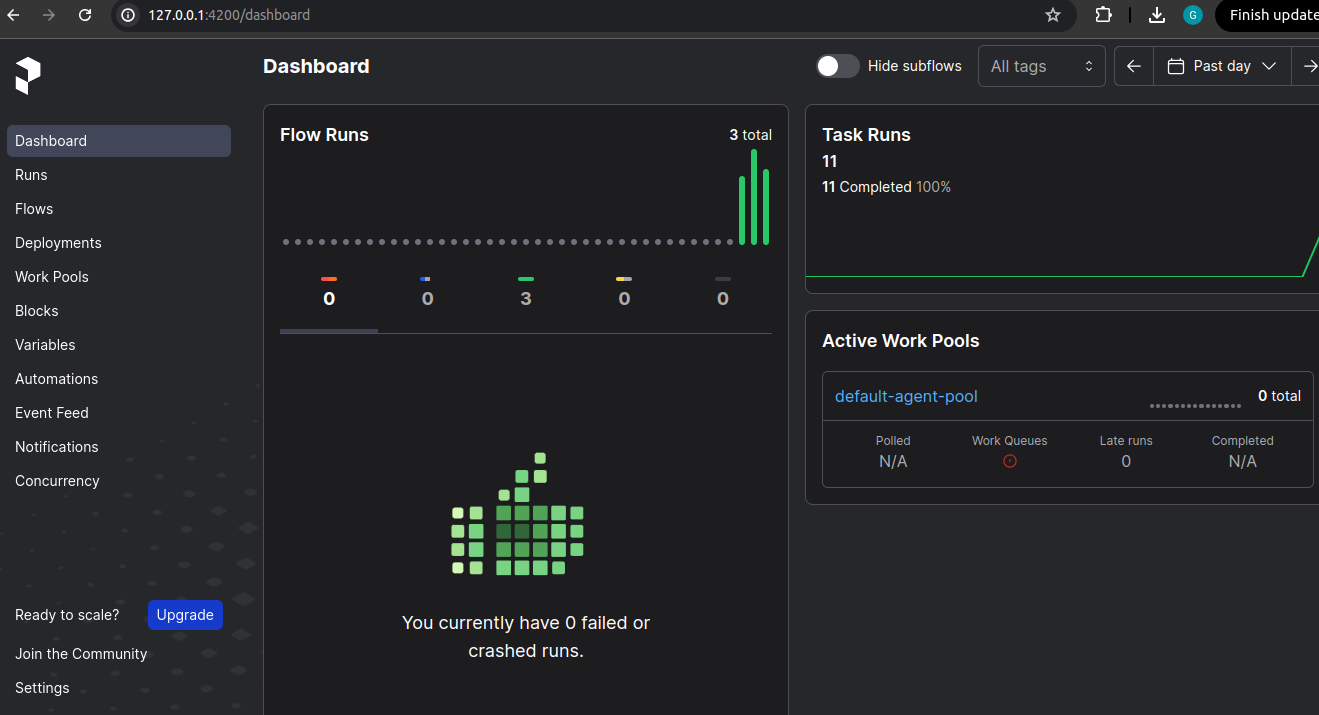Prefect for Workflow Orchestration
 Gabriel Okemwa
Gabriel Okemwa🚀 Revolutionizing Data Workflows with Prefect: The Future of Automation
In today's data-driven world, efficient workflow management is crucial for businesses to stay competitive. Enter Prefect, a cutting-edge workflow automation tool that's transforming how data engineers and data scientists handle complex data pipelines.
🔧 What is Prefect?
Prefect is an open-source workflow management system designed to handle modern data stacks. It allows you to build, schedule, and monitor data pipelines with unprecedented ease and flexibility.
🌟 Key Features:
Dynamic Workflows: Prefect adapts to your data, not the other way around. It handles conditional logic and dynamic task generation effortlessly.
Failure Handling: With built-in retry mechanisms and failure notifications, Prefect ensures your workflows are resilient and reliable.
Observability: Real-time monitoring and logging give you full visibility into your workflows, making debugging a breeze.
Versioning: Keep track of changes in your workflows with built-in versioning support.
💡 Why Prefect Stands Out:
Pythonic: Write your workflows in pure Python, leveraging your existing skills and libraries.
Scalable: From simple scripts to complex distributed systems, Prefect scales with your needs.
Cloud or Self-Hosted: Choose between Prefect Cloud for a managed solution or self-host for complete control.
Lets create work on a simple project to demonstrate the power of Prefect. In this project I will demonstrate how to create a basic ETL (Extract, Transform, Load) pipeline using Prefect. We'll extract some data from an API, transform it, and then load it into a CSV file.
To get started we will install the following python packages:
pip install prefect requests pandas
create a file named main.py and add the following code:
import requests
import pandas as pd
from prefect import flow, task
from prefect.tasks import task_input_hash
from datetime import timedelta
@task(cache_key_fn=task_input_hash, cache_expiration=timedelta(hours=1))
def extract(url: str) -> dict:
"""Extract data from an API"""
response = requests.get(url)
return response.json()
@task
def transform(data: dict) -> pd.DataFrame:
"""Transform the data into a DataFrame"""
df = pd.DataFrame(data["results"])
return df[["name", "height", "mass", "birth_year", "gender"]]
@task
def load(df: pd.DataFrame, path: str) -> None:
"""Load the data into a CSV file"""
df.to_csv(path, index=False)
@flow
def etl_flow(url: str, path: str):
"""Main ETL flow"""
raw_data = extract(url)
transformed_data = transform(raw_data)
load(transformed_data, path)
if __name__ == "__main__":
etl_flow("https://swapi.dev/api/people", "star_wars_characters.csv")
Now run the file using python main.py and you should have the following output:

Prefect comes with a dashboard which you can access at: http://127.0.0.1:4200/

Here are the key concepts in Prefect:
Tasks:
Fundamental units of work in Prefect
Python functions decorated with @task
Can be chained together to form complex workflows
Flows:
Containers for tasks
Define the structure and dependencies of your workflow
Decorated with @flow
State:
Represents the status of a task or flow execution
Examples: Pending, Running, Successful, Failed
Schedules:
Allow for automated, periodic flow runs
Can be defined using cron syntax or intervals
Storage:
Where flow code is stored
Options include local file system, GitHub, S3, etc.
Agents:
Processes that execute scheduled flows
Can run on various platforms (local, cloud, etc.)
Triggers:
Define conditions for task execution
Examples: all_successful, all_failed, any_successful
Parameters:
Allow for dynamic inputs to flows
Can be set at runtime
Retries:
Automatic re-execution of failed tasks
Configurable with max_retries and retry_delay
Caching:
Stores task results for reuse
Improves efficiency by avoiding redundant computations
Logging:
Built-in logging for tasks and flows
Helps with monitoring and debugging
Results:
Outputs of task executions
Can be stored and passed between tasks
Subscribe to my newsletter
Read articles from Gabriel Okemwa directly inside your inbox. Subscribe to the newsletter, and don't miss out.
Written by
